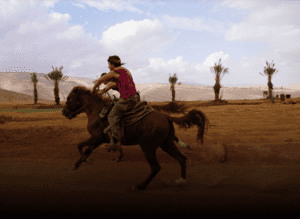(photo credit: Zeev Veez)
“This month shall be to you the head of the months; to you it shall be the first of the months of the year” (Exodus 12:2).
“Rosh Chodesh” literally means the head of the month. The Jewish calendar is made up of lunar months. The 15th of each month, which is halfway through the month, is marked by the full moon, and the new month is marked by the first sighting of the new moon. The first day of each new month is a day of celebration, with special prayers and customs. As the months are marked by the lunar cycle, some have 29 days, and others have 30. On months with 30 days, the 30th day of the ending month and the first day of the following month are both celebrated as Rosh Chodesh, the head of the month.
During the times of the Temple, additional sacrifices known as mussaf were brought. Today, since we no longer have the Temple, we recite a prayer called mussaf, which commemorates the sacrifices of Rosh Chodesh in the Temple. In addition to our regular daily prayers, we insert a paragraph known as Yaaleh Veyavo, asking God to bless us this month. We also recite a prayer known as Hallel, which is made up of select verses from Psalms, all praising God for His glory. A portion from the Torah is read in the synagogue, as well as Psalm 104 which contains the verse, “He made the moon for the appointed seasons” (Psalms 104:19).
The Shabbat preceding Rosh Chodesh is known as “Shabbat Mevarchim,” or the Sabbath of the Blessing. The day of the week that Rosh Chodesh will occur is announced, and a special prayer is said asking God for a happy, healthy, and all around good month. It is customary for a bride and groom to fast on their wedding day, as this is a holy day akin to Yom Kippur. But if a couple gets married on Rosh Chodesh, they are exempt from fasting, as it is a public festive day.
The mitzvah of observing “Rosh Chodesh” was the first one that God gave to the Jewish people upon leaving Egypt. Sanctifying a new month was a complicated process. As soon as someone glimpsed a sliver of the new moon, they had to present themselves to the Jerusalem High Court. There, two witnesses needed to testify that they had, in fact, seen the new moon. The court would declare the new month, and send messengers to spread the news to all of the Jewish people. Torches were placed high on mountaintops and hilltops in order to spread the message throughout the Holy Land. Nowadays, we no longer have the High Court in Jerusalem, and Rosh Chodesh is determined by a calendar created by our sages in the 4th century. Today you can still see remnants on the mountains where the torches were lit. One of them, Sartava, is where the Maccabees built a fortress in the First Century. Today at the foot of that mountain is a Jewish settlement named Masua, meaning “Torch,” to commemorate the torch that was lit on the peak of the mountain every Rosh Chodesh. The reason why Rosh Chodesh, blessing and counting the first of every new month, was the first commandment given is because knowing how to track the months connects us to God. Each Jewish holiday comes with certain spiritual powers, and so tracking the months correctly is vital for observing the holidays and connecting to God.
December 8th, on the Sabbath, will be Rosh Chodesh of the Hebrew month of Tevet. This is the month where winter comes in full swing, when it becomes dark early, and sometimes it can feel like we are losing light. In this month, we celebrate Hannuka, also known as the Festival of Lights. At The Heart of Israel, we would like to wish you a happy and blessed month of Tevet, and a festive Hannukah.




